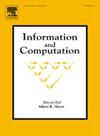SENDAI: A framework for joint reasoning about sensor data acquisition and sensor data analytics
IF 1
4区 计算机科学
Q3 COMPUTER SCIENCE, THEORY & METHODS
引用次数: 0
Abstract
Sensors are increasingly being deployed to monitor critical infrastructure. However, as the number of sensors being deployed increases, so does the amount of sensor data that must be transmitted, stored, and analyzed. Thus, a significant number of methods have been proposed to improve sensor data acquisition and analytics. However, the proposed strategies and methods generally focus exclusively on either sensor data acquisition or analytics, thus ignoring the possible optimization that can be performed by taking a holistic view. To explore this opportunity, this paper provides an overview of sensor data acquisition and analytics and an analysis of two very different use cases, specifically monitoring wind turbines and measuring utility consumption using smart meters. Based on this analysis, the Framework for joint Sensory Data Acquisition and Analytics (SENDAI) is proposed, an integrated framework that models sensor data acquisition and analytics together, thus enabling holistic reasoning about sensor data acquisition and analytics. To demonstrate how the information in SENDAI can be used to reason about sensor data acquisition and analytics together, we show how sensor data acquisition can be optimized to respond efficiently to query workloads.
仙台:传感器数据采集和传感器数据分析联合推理框架
越来越多的传感器被用于监控关键的基础设施。然而,随着部署的传感器数量的增加,必须传输、存储和分析的传感器数据量也在增加。因此,已经提出了大量的方法来改进传感器数据的采集和分析。然而,所提出的策略和方法通常只关注传感器数据采集或分析,从而忽略了通过采取整体观点可以执行的可能的优化。为了探索这一机会,本文概述了传感器数据采集和分析的概况,并分析了两个非常不同的用例,特别是使用智能电表监测风力涡轮机和测量公用事业消耗。在此基础上,提出了联合传感器数据采集和分析框架(SENDAI),这是一个集成框架,将传感器数据采集和分析建模在一起,从而实现对传感器数据采集和分析的整体推理。为了演示如何使用SENDAI中的信息来推断传感器数据采集和分析,我们将展示如何优化传感器数据采集以有效响应查询工作负载。
本文章由计算机程序翻译,如有差异,请以英文原文为准。
求助全文
约1分钟内获得全文
求助全文
来源期刊

Information and Computation
工程技术-计算机:理论方法
CiteScore
2.30
自引率
0.00%
发文量
119
审稿时长
140 days
期刊介绍:
Information and Computation welcomes original papers in all areas of theoretical computer science and computational applications of information theory. Survey articles of exceptional quality will also be considered. Particularly welcome are papers contributing new results in active theoretical areas such as
-Biological computation and computational biology-
Computational complexity-
Computer theorem-proving-
Concurrency and distributed process theory-
Cryptographic theory-
Data base theory-
Decision problems in logic-
Design and analysis of algorithms-
Discrete optimization and mathematical programming-
Inductive inference and learning theory-
Logic & constraint programming-
Program verification & model checking-
Probabilistic & Quantum computation-
Semantics of programming languages-
Symbolic computation, lambda calculus, and rewriting systems-
Types and typechecking
 求助内容:
求助内容: 应助结果提醒方式:
应助结果提醒方式:


